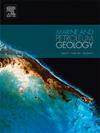A novel method for DCS reservoir modeling with consideration of oil-water relationships
IF 3.7
2区 地球科学
Q1 GEOSCIENCES, MULTIDISCIPLINARY
引用次数: 0
Abstract
Distributary Channel System (DCS) reservoirs play a crucial role in storing oil and gas, and several modeling methods are used to study them. Among these methods, magnetic random walk is a method with unique advantages and can achieve better results in some scenarios. However, current magnetic random walk models cannot effectively consider oil-water relationship information in wells, resulting in the potential “water above oil” contradiction. To address this problem, this article proposes a novel algorithm that considers oil-water relationships. This algorithm inherited the idea of the magnetic random walk. It not only considers the distinction between channel and non-channel wells, but also considers the distinction between oil and water properties within channel wells. To avoid potential oil-water contradictions, an oil-water contradiction avoidance mechanism is introduced. In a case study, the new algorithm indeed showed better performance, effectively overcoming potential oil-water contradiction problems. Compared to existing algorithms, the new algorithm incorporates more geological constraints (structural height information and oil-water properties information) and is an important step in improving the accuracy of well-interval predictions, which can provide important support for oil and gas development and has important application prospects.
求助全文
约1分钟内获得全文
求助全文
来源期刊

Marine and Petroleum Geology
地学-地球科学综合
CiteScore
8.80
自引率
14.30%
发文量
475
审稿时长
63 days
期刊介绍:
Marine and Petroleum Geology is the pre-eminent international forum for the exchange of multidisciplinary concepts, interpretations and techniques for all concerned with marine and petroleum geology in industry, government and academia. Rapid bimonthly publication allows early communications of papers or short communications to the geoscience community.
Marine and Petroleum Geology is essential reading for geologists, geophysicists and explorationists in industry, government and academia working in the following areas: marine geology; basin analysis and evaluation; organic geochemistry; reserve/resource estimation; seismic stratigraphy; thermal models of basic evolution; sedimentary geology; continental margins; geophysical interpretation; structural geology/tectonics; formation evaluation techniques; well logging.
 求助内容:
求助内容: 应助结果提醒方式:
应助结果提醒方式:


